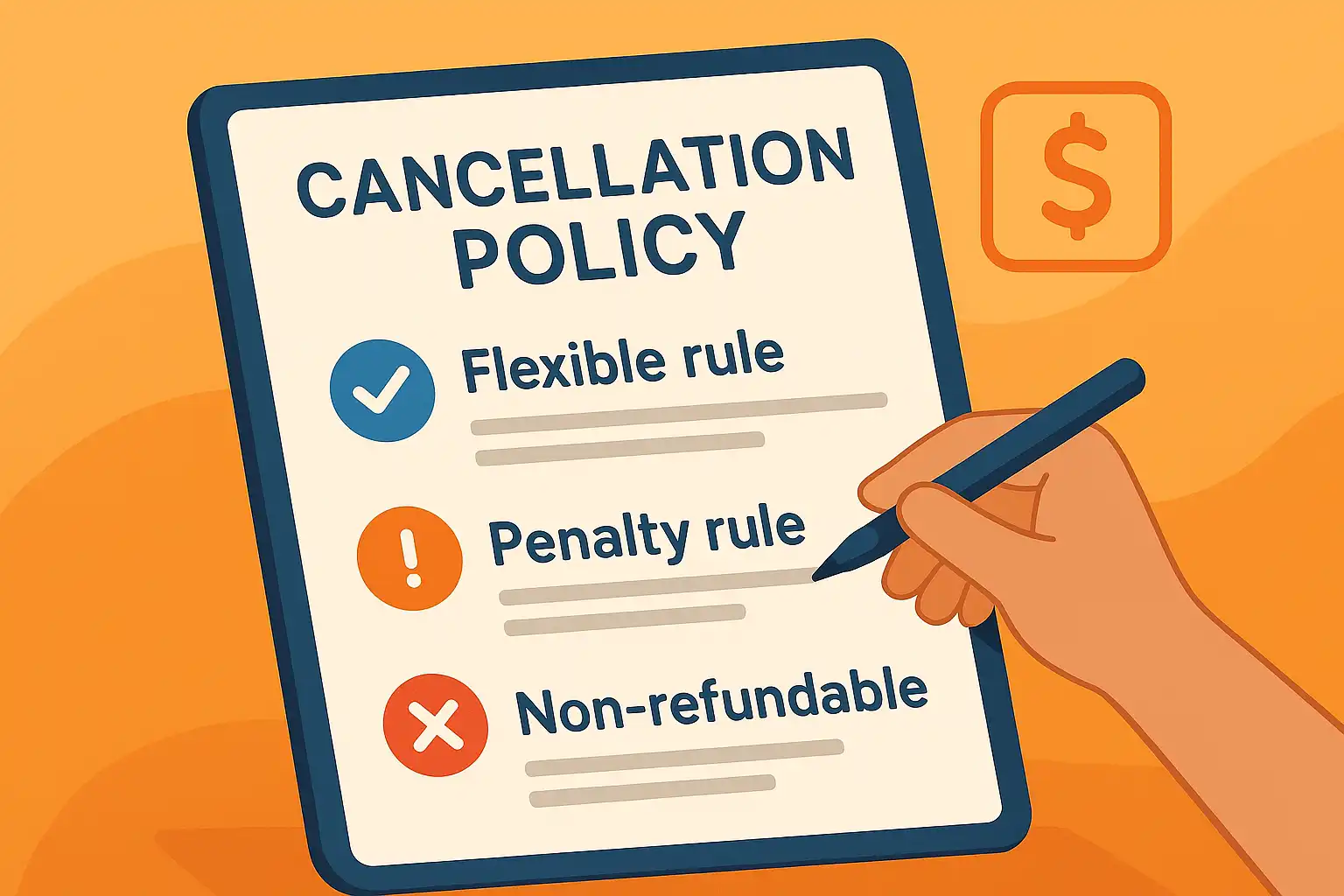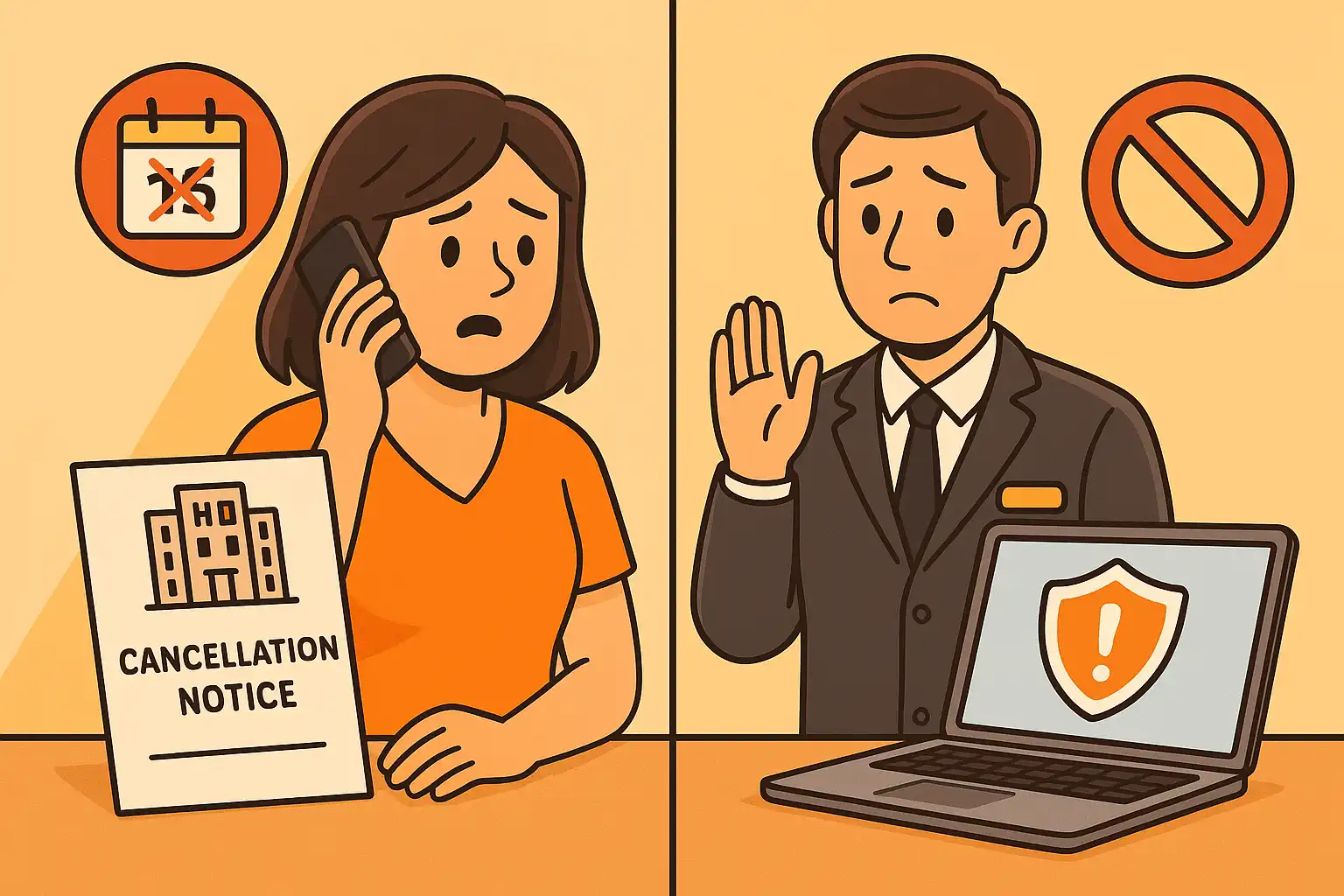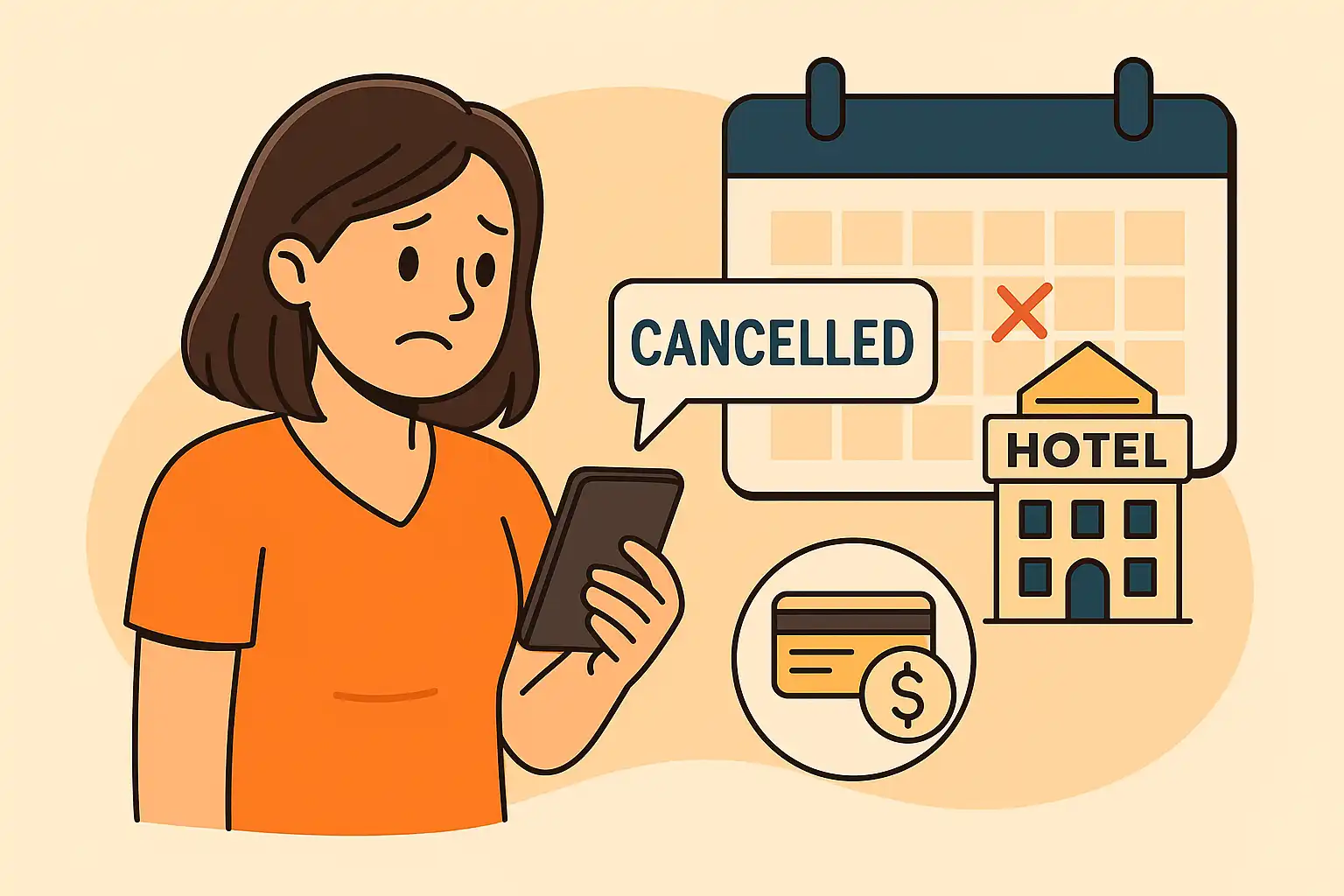Hotel Cancellation Rules: Everything You Need to Know
Nov 17, 2025
 Mika Takahashi
Mika TakahashiPopular Categories
Hotel Technology & InnovationHotel Operations OptimizationDigital MarketingIndustry TrendsRevenue ManagementHospitality Industry
Popular Categories
Trending Post

Hotel Walk Letter Template: Professional Guest Communication

Online Travel Agents: What They Are and How They Work

Hotel Security Systems: Modern Protection Solutions

Hotel Advertising: Complete Guide to Boost Bookings and Revenue

25 Hotel Marketing Strategy Ideas for 2025: Complete Guide

AI Reservation Agent: Revolutionizing Hotel Booking and Guest Experience

PMS Communication: Streamlining Property Management Through Effective Guest Messaging
Table of contents
Nearly one in three hotel reservations ends up canceled. That makes understanding your hotel cancellation rules absolutely essential—not just for your guests, but for your bottom line. Whether you’re managing bookings for business travelers with unpredictable schedules or leisure guests planning months ahead, cancellations can hit revenue hard if you don’t have clear policies in place.
Over the last decade, hotel cancellation policies have grown more complex. Hotels need to protect revenue while keeping guests happy. You’ll find everything from free cancellation windows to strict non-refundable bookings. Navigating these options can be tricky, but it’s crucial for effective revenue management and operational planning.
In this guide, we’ll break down hotel cancellation rules in detail. We’ll explain how different policy types affect room rates, share strategies to reduce costly cancellations, and highlight exceptions that might let guests bypass strict rules. We’ll also cover recent regulatory changes, like California’s 24-hour cancellation law, and offer practical tips for managing cancellations across various booking platforms.

What Are Hotel Cancellation Rules?
Hotel cancellation rules are the legally binding terms that define how guests can cancel their reservations, what refunds they’re entitled to, and which penalties apply. These rules form a contract between you and your guests from the moment a booking is confirmed, protecting your property from last-minute cancellations and unexpected revenue loss.
A solid hotel cancellation rules includes several key elements you need to communicate clearly:
- Cancellation window: The timeframe before check-in when guests can cancel without penalty. This usually ranges from 24 to 72 hours before arrival.
- Cancellation fee: What guests owe if they cancel late—often a percentage of the booking or the cost of one night’s stay.
- Refund policy: Whether guests get a full refund, partial refund, or no refund at all.
- Modification terms: Rules about changing booking dates, room types, or other details without canceling outright.
Keep in mind, cancellation rules differ from modification policies. Cancellation means the guest is completely ending their stay, while modifications may let them adjust dates or room types, often with more flexibility.
You’ll want to ensure your cancellation terms are visible in multiple places: your confirmation emails, booking pages, and at the front desk. Guests often ask about cancellation terms when checking in, especially during busy periods or special events, so your team should be ready to explain them clearly.
Types of Hotel Cancellation Policies
Hotels use different hotel cancellation rules models to balance guest flexibility with revenue protection. The type you choose directly impacts your room rates—more flexible policies usually come with a 10-25% price increase compared to stricter options.
Picking the right hotel cancellation policy isn’t just about protecting revenue. It also affects guest satisfaction and operational efficiency. Flexible policies attract bookings from travelers wary of changing plans, while stricter rules give you more certainty during peak seasons.
Here’s a quick overview of the main types:
| Policy Type | Cancellation Window | Refund Amount | Rate Premium | Best For |
|---|---|---|---|---|
| Free Cancellation | 24-48 hours | 100% | 10-15% higher | Business travelers |
| Partial Refund | Tiered deadlines | 100% to 0% sliding | 5-10% higher | Leisure travelers |
| One Night Penalty | 24-48 hours | Full less one night | Standard rate | Weekend trips |
| Non-Refundable | No window | 0% | 15-25% discount | Confirmed plans |
Free Cancellation Policy
Free cancellation lets guests cancel up to 24-48 hours before check-in with no penalty. This is the most guest-friendly option and offers peace of mind for travelers with uncertain schedules.
Major hotel chains like Marriott, Hilton, and Hyatt often offer free cancellation during off-peak seasons when demand is lower. The cancellation window usually closes by late afternoon one or two days before arrival, giving you time to resell the room.
This flexibility comes at a cost: room rates for free cancellation bookings typically run 10-15% higher than non-refundable rates. That premium covers the risk of last-minute cancellations and potential empty rooms.
Business travelers especially appreciate this option because their plans can change quickly. Offering free cancellation can help you attract corporate accounts and frequent travelers who value flexibility over savings.
Non-Refundable Policy
Non-refundable policies offer discounted room rates—usually 15-25% less—but guests lose their entire payment if they cancel, no matter how far in advance. These policies provide guaranteed revenue and reduce no-shows.
You’ll often see non-refundable rates during peak travel seasons or major special events like the Super Bowl or Comic-Con. Hotels can confidently sell out during these times, so they lock in revenue with strict cancellation terms.
Non-refundable bookings typically require full payment upfront or within 24 hours. While they offer savings to guests, these policies carry significant risk if plans change unexpectedly. That’s why travel insurance is especially important for these bookings.
Partial Refund Policy
Partial refund policies offer a sliding scale of refunds based on when the guest cancels. For example, 100% refund if canceled 7+ days before arrival, 50% refund if canceled within 72 hours, and no refund if canceled within 24 hours.
This is the most common policy among midscale hotels. It balances guest flexibility with revenue protection and encourages early cancellations so you can resell rooms.
Hotels often deduct administrative fees ($25-$50) from partial refunds to offset processing costs and discourage frequent cancellations.
This model suits leisure travelers who book well in advance but might need to cancel due to weather, family emergencies, or work conflicts.
One Night Penalty Policy
With this policy, guests who cancel within 24-48 hours of check-in pay for the first night but receive a full refund for the rest.
Boutique hotels and independents often use this during shoulder seasons. It offers some flexibility while protecting revenue from last-minute cancellations.
Guests can usually modify bookings without penalty earlier in the window, which helps maintain satisfaction.
Pro Tip:
Train your front desk staff to explain these policies clearly at check-in and when guests call. A well-informed team reduces confusion and improves guest trust.
Factors Affecting Cancellation Rules
Cancellation policies aren’t one size fits all. Even within the same property, different bookings can have very different cancellation terms. Several factors influence these rules:
Seasonality and Demand Periods
During peak seasons, like Christmas or summer vacations, hotels tighten cancellation windows and may require longer notice periods—sometimes 14 days or more.
Special events—think major concerts, conventions, or sports tournaments—trigger stricter cancellation rules and higher penalties. Hotels often switch to non-refundable policies to lock in revenue.
Off-peak seasons tend to have more flexible terms, sometimes even allowing same-day cancellations to encourage bookings.
Booking Platform Influence
Direct bookings usually come with the most favorable cancellation terms and more room for exceptions. Hotels prefer direct reservations because they avoid OTA commissions.
Third-party platforms like Expedia or Booking.com often add their own rules and fees, reducing the effective cancellation window and complicating refunds.
Opaque booking sites (like Hotwire) tend to offer fully non-refundable deals with no flexibility.
Room Type and Rate Category
Luxury suites and premium rooms often require longer cancellation windows—sometimes 72 hours or more—due to their higher value and harder resale.
Promotional or discounted rates usually come with stricter rules, including non-refundable terms.
Corporate negotiated rates often have the most flexible cancellation policies, reflecting the unpredictable nature of business travel.
Package deals that bundle flights, cars, and hotels typically adopt the strictest cancellation terms among all components.
Myth vs Reality:
Myth: All hotel cancellation policies are rigid and non-negotiable.
Reality: Direct bookings and loyal guests often get more flexibility. Proactive communication can secure fee waivers or date changes.

Special Circumstances and Cancellation Rules
Certain bookings require unique cancellation terms due to their complexity or revenue impact.
Group Booking Policies
Groups of 10+ rooms usually require 30 to 60 days’ prior notice to cancel without penalty. Penalties increase as the event date approaches, sometimes reaching 100% charges within two weeks.
Weddings and corporate retreats often have even stricter rules and non-refundable deposits.
Extended Stay and Minimum Length Requirements
Longer stays often demand longer cancellation notice—7 days or more—to avoid fees.
Minimum length stays during peak periods or special events may be non-modifiable, meaning guests can’t shorten their stay without penalties.
Force Majeure and Emergency Situations
Natural disasters, government travel restrictions, or medical emergencies typically override normal cancellation policies. Most hotels offer full refunds or rebooking options in these cases, though documentation is usually required.
COVID-19 forced many hotels to adopt unprecedented flexibility, setting new expectations for handling unforeseen circumstances.
How to Cancel Hotel Reservations
Handling cancellations smoothly benefits both your operations and guest relations.
Cancelling Direct Hotel Bookings
The best approach is to have guests contact your reservations team directly, with their confirmation number and name. This lets you confirm cancellations immediately and explain any fees or exceptions.
Online cancellations through your website or app offer 24/7 convenience and automatic confirmation emails.
Email requests work too, especially if phone lines are busy. Make sure guests include all relevant details to speed up processing.
In-person cancellations at the front desk are useful for same-day changes or guests already on property.
Third-Party Platform Cancellations
Guests must cancel through the OTA’s system, which can delay processing and complicate refunds.
OTAs may charge additional fees and take longer to refund, sometimes adding 1-2 business days.
Keep clear records of all communications and confirmations to resolve disputes if needed.
Strategies to Avoid Cancellation Fees
You can reduce cancellation losses with smart booking and communication strategies.
Booking Timing and Policy Selection
Encourage guests to book flexible rates if their plans aren’t set. The extra 10-15% cost often pays for itself in peace of mind.
Monitor bookings for a day or two after confirmation. Some platforms allow penalty-free modifications during this window.
Avoid booking during special events or peak seasons if flexibility is important.
Hotel loyalty programs often include cancellation perks—promote these to frequent guests.
Communication and Negotiation Tactics
When guests notify you early about cancellations, you can often negotiate fee waivers or rescheduling.
Train your team to listen and respond empathetically. Genuine reasons like medical emergencies or travel disruptions can justify exceptions.
Offer rebooking credits or alternative dates to keep revenue within your property.
Travel Insurance and Cancellation Protection
Travel insurance can cover cancellation fees but varies widely in scope.
Most policies cover cancellations for illness, emergencies, or weather. “Cancel for any reason” plans offer broader protection but cost more.
Credit card travel benefits sometimes include hotel cancellation coverage—check the terms carefully.
Weigh insurance costs against flexible rate premiums to find the best value for your guests.

Understanding No-Show Policies
No-shows are the toughest cancellations to handle. They usually trigger full charges for the first night or the entire stay.
A no-show happens when guests don’t arrive by the specified time (often midnight or 6 AM the next day) without canceling.
Hotels enforce no-show fees strictly because these lost rooms can’t be resold.
Some properties offer grace periods of a few hours if guests communicate delays due to flight or traffic issues.
Repeat no-shows can affect future booking privileges or require advance payment.
To avoid no-show fees, encourage guests to call if they’re running late or need to cancel.
Emergency situations may qualify for fee waivers but require documentation and manager approval.
Key Takeaways
Hotel cancellation rules are a balancing act between protecting revenue and meeting guest expectations. Clear, well-communicated policies reduce confusion and financial risk.
- Free cancellation policies attract bookings but come with higher rates.
- Non-refundable bookings secure revenue but carry risk for guests.
- Partial refund and one-night penalty policies offer middle-ground flexibility.
- Seasonality, room types, booking platforms, and special events impact cancellation terms.
- Direct bookings usually offer better cancellation options and exceptions.
- Proactive communication and travel insurance can minimize losses.
- No-show policies are strict but necessary to protect your inventory.
Stay transparent with your guests, train your team to handle cancellations empathetically, and use your PMS tools to automate updates and confirmations. That way, you’ll keep cancellations manageable and maintain guest trust—even when plans change.
Always review your hotel cancellation rules regularly to align with market demand and operational realities. When you get this right, cancellations become less of a headache and more of a manageable part of your business.
